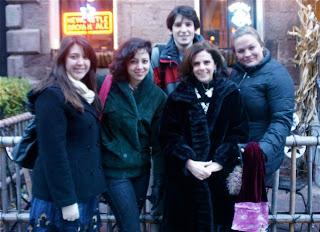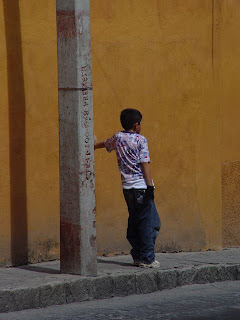 Today, taking the train to Penn, I watched my world going by. Twice herds of deer—if you can call four, then five deer a herd—were scattered by the oncoming locomotion and made a heady dash for the margins. Near Rosemont a fox was nearly caught by the tail. Near Overbrook a hawk got mired in some kind of mid-air scuffle with a bird half its size and twice as fast.
Today, taking the train to Penn, I watched my world going by. Twice herds of deer—if you can call four, then five deer a herd—were scattered by the oncoming locomotion and made a heady dash for the margins. Near Rosemont a fox was nearly caught by the tail. Near Overbrook a hawk got mired in some kind of mid-air scuffle with a bird half its size and twice as fast.
Once in the city, I walked, as I always do—through 30th Street, toward Drexel, then west and south, toward Penn. I was followed, it would seem, by that hawk (or that hawk's cousin), which finally rested in a thorny tree and did not protest against its portrait.
Later, I would sit with my class at the Bubble House, where we poured variously tinted pots of tea (and one coffee) and shared a long, long lovely lunch. How do you say goodbye? Maybe you don't. That's how I'm figuring on it.
Viewing: Blog Posts Tagged with: University of Pennsylvania advanced nonfiction, Most Recent at Top [Help]
Results 1 - 9 of 9
Blog: Beth Kephart Books (Login to Add to MyJacketFlap)
JacketFlap tags: University of Pennsylvania advanced nonfiction, Bubble House, Add a tag
Blog: Beth Kephart Books (Login to Add to MyJacketFlap)
JacketFlap tags: University of Pennsylvania advanced nonfiction, Add a tag
 A man walking by took our picture.
A man walking by took our picture. It's a little fuzzy.
But.
I will forever treasure it.
Treasure them.
Blog: Beth Kephart Books (Login to Add to MyJacketFlap)
JacketFlap tags: University of Pennsylvania advanced nonfiction, English 145, Add a tag
 Sometimes when I come to this computer and choose a photograph and settle it into its place on this blog, I only know what mood I am in, not what "what" I have to say. That is the case this evening. It has been a slow Sunday, one that has left me feeling awkward in relationship to myself.
Sometimes when I come to this computer and choose a photograph and settle it into its place on this blog, I only know what mood I am in, not what "what" I have to say. That is the case this evening. It has been a slow Sunday, one that has left me feeling awkward in relationship to myself.
For example: At church this morning, a perfect stranger approached me suggesting that I must not get much sleep; it was the darkness beneath my eyes, she said, that gave my insomnia away. But. I wanted to say. But: I actually slept last night. Five hours, I wanted to say. Five. Whole. Hours. Logged. Last. Night. It occurred to me then how truly frightening I must be on most days, how I am the only one who does not see me.
In the absolute still of the afternoon, I pondered a revision to a novel. I asked myself, What do you have left? I did not yield (unto myself) a sufficient answer. Sometimes, it seems, I don't have all that much left.
Then, tonight, my student, K., sent in her final words about the class I've taught at Penn. Her words were so smart, they were so honest, they were so earned that I just read them through, and cried. K.'s words should make me happy, and in many ways they do. But they signal the end of something I have loved—those particular students, this particular year, our together journey of discovery—and there is no cure for that.
Blog: Beth Kephart Books (Login to Add to MyJacketFlap)
JacketFlap tags: University of Pennsylvania advanced nonfiction, English 145, Add a tag
 It rained yesterday, and the wet was in my socks and in my hair, it was the glance across my jacket, it was the chill in the room of Kelly Writers House, where my students had gathered to discuss their literary reportage projects. We got the heaters turned on to blast the chill away. We had peanut butter cookies to bolster our thinking. We measured how far each writer had come. We talked through the what next, the what now, the what still.
It rained yesterday, and the wet was in my socks and in my hair, it was the glance across my jacket, it was the chill in the room of Kelly Writers House, where my students had gathered to discuss their literary reportage projects. We got the heaters turned on to blast the chill away. We had peanut butter cookies to bolster our thinking. We measured how far each writer had come. We talked through the what next, the what now, the what still.
There is no perfect, I reminded them. There is only working toward good. Only studying structure and frame. Only vigilance against excess, presumption, assumption. Only remembering that it is in revision that we often find the heart of our story. Good writing takes time. Take that time, I insisted.
This week, the students will write their final pieces, reflections on "how their view of writing in general and of their own work in particular has been shaped, pummeled, reinforced, redirected, teased, or afflicted by English 145." I am interested, I have told them, " in how what you have read has shaped what you will likely read (and not read) moving forward. I am interested in how the work of your fellow students has broadened your idea of what writing can be. I am interested in where you think you will go next, as an emerging author."
They'll send me their papers. We'll celebrate with a final lunch. And then that will be it. My own, strange, wonderful journey with English 145.
Blog: Beth Kephart Books (Login to Add to MyJacketFlap)
JacketFlap tags: The Heart is Not a Size, Dangerous Neighbors, University of Pennsylvania advanced nonfiction, Add a tag
 My imagination has lived, these past many months, within the agitation of conflicting eras and places.
My imagination has lived, these past many months, within the agitation of conflicting eras and places.
There were the three rounds of copy edits for The Heart is Not a Size, returning me again and again (in my mind's eye) to a squatters village in Juarez. There was all the final shaping of Dangerous Neighbors, so that there I was, walking (feeling as if I were walking) the crowded streets of 1876 Philadelphia. There were the first and second drafts of my novel for adults, which dreamed me toward the wreckage of an abandoned insane asylum. And there was Penn, the advanced nonfiction class, where I gave myself over to the landscape of memoir and narrative nonfiction.
On the afternoons when I danced there was nothing in my head but song.
Projects come to an end. The imagination grows lonely. There is no time at the moment to be anything, do anything but work and home.
But I feel that inevitable emptiness ticking, a desire to go somewhere far and unknown, a desire to make something new knowable.
Blog: Beth Kephart Books (Login to Add to MyJacketFlap)
JacketFlap tags: University of Pennsylvania advanced nonfiction, English 145, Lititz, Add a tag
 And so in class, yesterday, we began to ask ourselves what teaching can deliver, what it is worth. What are the residuals of an advanced nonfiction workshop, for example? What will be carried forward, one short month from now, when we have had our last class and said our goodbyes (but not permanent goodbyes; that just won't do)? What will remain a decade hence, or two?
And so in class, yesterday, we began to ask ourselves what teaching can deliver, what it is worth. What are the residuals of an advanced nonfiction workshop, for example? What will be carried forward, one short month from now, when we have had our last class and said our goodbyes (but not permanent goodbyes; that just won't do)? What will remain a decade hence, or two?
I want my students leaving English 145 knowing more about how they think and why they think what they do. I want them hungry, always, to know more, precise in articulating their beliefs, willing to take incalculable risks and to start all over again. I want them daring and I want them alert and I want them, most of all, to know their own value, to never doubt it.
Can we teach that? Perhaps not. We can only give it room to grow.
Blog: Beth Kephart Books (Login to Add to MyJacketFlap)
JacketFlap tags: The Heart is Not a Size, Horace Kephart, Patricia Hampl, Great Smoky Mountains National Park, Club La Maison, Body Pump, Alyson Hagy, University of Pennsylvania advanced nonfiction, Ken Burns, Add a tag
 Today: Awakened at 1:35 AM, I come downstairs and do not sleep. A few lines make their way to a blank page; I do not know if the lines are good.
Today: Awakened at 1:35 AM, I come downstairs and do not sleep. A few lines make their way to a blank page; I do not know if the lines are good.
Morning, then, and at the gym, I find Ann, an old friend, long lost; I'd once thought forever. In the large group room Theresa, leading the Body Pump class, has chosen the music of men. She turns her barbell into a guitar and sings her Aerosmith loud; the rest of us abide her antics, need her antics, love them. We don't scream the pain we feel. Many times a week Theresa leads this class and yet on Saturday it is as if we are her only students, her passion just for us.
Mid-morning and in my in-box I find the first official review of The Heart is Not a Size. I am overcome. The reader has found within my work just precisely what I hoped a reader would. A faster plot. The smell of dust. The have-everythings who learn from those who possess little.
Noon, and while shopping for the small dinner party that I'm throwing Sunday, I find my father at the Farmer's Market, sit with him while he eats his lunch. Then there is the frenzy of deciding and shopping. Yes, the serrano ham and the lavash, the strange apples from the Lancaster trees, the fatter berries and the insanely rotund scallions, and why not those tomatoes, which cannot decide what size they wish to be.
Mid afternoon, and I sit with the work of my fantastic Penn students, who move me to tears with the way that they think; I sit with Patricia Hampl. And then time alone with the Horace Kephart segments of the Ken Burns film, "America's Best Idea" (go to episode four, plays segments five and eleven). I don't care what you want to say about my great-grandfather. He did this country good. He saved what remained of the Great Smoky Mountains from the avaricious loggers, all the while knowing that once the park was made, it would not be his homeland anymore.
Later, a conversation with Andra. An email exchange with my friend Buzz. A note from Alyson Hagy, perhaps the grandest writing teacher of all.
Later, dinner.
Later, now.
Myself.
Blog: Beth Kephart Books (Login to Add to MyJacketFlap)
JacketFlap tags: Michael Ondaatje, Natalia GInzburg, Annie Dillard, University of Pennsylvania advanced nonfiction, Paul West, Add a tag
 Yesterday the brave souls of English 145 at Penn lobbed Natalia Ginzburg, Paul West, and Annie Dillard around the room—declaiming, declaring, rebutting, suggesting, insisting on asynchronous points of view.
Yesterday the brave souls of English 145 at Penn lobbed Natalia Ginzburg, Paul West, and Annie Dillard around the room—declaiming, declaring, rebutting, suggesting, insisting on asynchronous points of view.
West, via his essay "Remembrance of Things Proust," emerged variously as brilliant, smug, teacherly, full of his own conceits, and ultimately vulnerable. Ginzburg, with her classic "My Craft," riled the suspicious among us with her declaration that, "When we are happy our imagination is stronger; when we are unhappy, memory acts with greater force." In "To Fashion a Text," Dillard won the hard-to-win with her words, "What impels the writer is a deep love for and respect for language, for literary forms, for books. It's a privilege to muck about in sentences all morning. It's a challenge to bring off a powerful effect, or to tell the truth about something. You don't do it from willpower; you do it from an abiding passion for the field... Willpower is a weak idea; love is strong."
We took a break. We caught our breath. We leaned in toward the end of the day. We sat for a moment with Larry Woiwode, his words: "All experience is simultaneous, stilled and sealed in itself, and we manage daily by imagining we move from minute to minute, somehow always ahead. Our multiple selves collide at every second of intersection, one or the other vying for supremacy, the scars of the past flooding through the present texture of our personality, and maturity is knowing how to govern the best combination of them."
Finally we agreed to read Ondaatje's Running in the Family, perhaps my favorite memoir of all time. It's not just story. It's not just language. It's the making of memoir, revealed.
Blog: Beth Kephart Books (Login to Add to MyJacketFlap)
JacketFlap tags: memoir, marriage, Still Love in Strange Places, El Salvador, University of Pennsylvania advanced nonfiction, Add a tag
In preparing to teach the advanced nonfiction course at Penn, I read and re-read and remember. I re-enter the mind-space that took me here, to the first page of my Salvador memoir, Still Love in Strange Places.
The tear runs like a river through a map, hurtling down toward his right shoulder, veering threateningly at his neck, then diverting south only to again pivot east at the fifth brass button of his captain's uniform. Below the tear, two more brass buttons and the clasp of his hands, and below all that, the military saber; the loosening creases on his pants; the shoes with their reflections of the snap of camera light. He is one of three in a sepia-colored portrait, and someone had to think to save his face. Someone had to put the photo back together—re-adhere the northeast quadrant of this map with three trapezoids of tape so that his left hand would fall again from his left elbow and he would still belong to us. We suppose he is the best man at a wedding. We suppose that it was eighty years ago, before the matanza, before he was jailed and then set free, before he saved the money to buy the land that became St. Anthony's Farm.
“Did I ever tell you what my grandfather did the year the farm first turned a profit?”
“No.”
“He threw the money into the air, the bills, and they got caught up with a wind.”
“And so?”
“And so he ran after those colones through the park. Chased his own money through the leafy streets of Santa Tecla. Imagine that.”
I do. I am often imagining that. Imagining that I know him—this man whose likeness is my husband's face, whose features are now borne out by my son. His are the sepia eyes that passed through me. His is the broad nose, the high cheekbones, the determined mouth, the face not like an oval or a heart, but like a square. He died long before I'd ever meet him, but I carried him in my blood. Just as the land carries him still, remembers. Just as St. Anthony's Farm will someday, in part, belong to my son, requiring him to remember what he never really knew, to put a story with the past. Words are the weights that hold our histories in place. They are the stones that a family passes on, hand to hand, if the hands are open, if the hearts are.
“You look like your great-grandfather.”
“I do?”
“Yes. Come here. See? That’s him, in the photograph.”
“Him? My great-grandfather?”
“Yes.”
“But he looks so young.”
“Well, he was young once. But that was a long time ago, in El Salvador.”




The Bubble House, you say? I need to see there.
A couple of weeks ago, a deer was lost in downtown Toronto.
I love train rides. Such a time for reflection and observation.
Great portrait of the hawk in the thorns. I feel like a poem may be in that picture :)
If you get the chance, I posted a dance video clip from So You Think You Can Dance. I always need my dance fix!
As long as there is a Bubble House and tea, you always have a place to gather.
it seems to me as if you really enjoyed giving this class.. it must have been inspiring for the girls.
i was just in london a few weeks ago, and they have foxes there, in the middle of the city! now, the only "wild life" i am seeing are some cute little mice with ear tags, sitting in a cage in front of me, while i am writing my phd thesis in the laboratory..
btw, hurry up with writing that book! i can't wait to read it.
Sometimes you wish you could say goodbye, but simply cannot...
Beautiful photo and lovely word imagery, too.
Love the hawk. The other morning we were driving over the mountain toward Harrisburg and we spotted about a half dozen along the way.